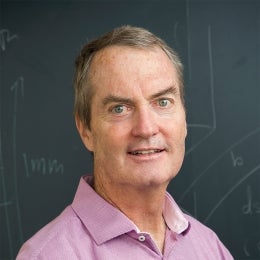
The University of California, Santa Barbara Library recently finalized the processing and digitization of the faculty papers of renowned theoretical physicist and string theorist Joseph Polchinski (1954–2018). The papers offer scholars and enthusiasts unprecedented access to the works of one of the most influential theoretical physicists of the 20th and early 21st centuries. This comprehensive archive encompasses a vast array of materials in over 100 manuscript boxes, including publications, correspondence, and handwritten lecture notes and calculations, chronicling Polchinski's academic journey from his graduate studies to his tenure at UCSB.
Considered one of the most creative physicists of his generation, Polchinski joined UCSB in 1992 as a professor of physics and a permanent member of the Kavli Institute for Theoretical Physics (KITP), a hub for collaborative research in theoretical physics. His presence at KITP significantly enhanced the institute’s reputation, attracting leading physicists worldwide and fostering a vibrant intellectual community. Polchinski's influence extends beyond his research. His two-volume textbook, String Theory, published in 1998, remains a foundational resource for students and researchers alike. Throughout his career, he received numerous accolades, including the Dirac Medal in 2008 and the Breakthrough Prize in Fundamental Physics in 2017, recognizing his profound impact on our understanding of the universe.
Polchinski was a giant force in the development of string theory, the ambitious attempt to achieve a "theory of everything," which envisions the fundamental particles of nature as tiny wriggling strings. "Joe’s many important contributions to particle theory are characterized by great elegance, clarity, and impact," remarked David Gross, former KITP director and 2004 Nobel Laureate. "He has had many of the most fruitful ideas about gauge theories, string theories, and the relations between them."
The Joseph Polchinski Papers features a remarkable assortment of documents that provide a unique window into Polchinski’s thought process and scholarly evolution. Among the most valuable materials are his original research notebooks, densely filled with equations, diagrams, and annotations that trace the development of his ideas. Drafts of published and unpublished manuscripts reveal the progression of key scientific arguments and collaborations. The archive also includes detailed referee reports, grant applications, teaching materials, and syllabi, offering insight into his roles as educator and mentor.
Notable materials in the collection include extensive correspondences with prominent physicists such as Edward Witten and Leonard Susskind, reflecting the dynamic discourse that shaped modern theoretical physics. These letters often discuss new theories, critique recent papers, and propose bold conjectures, illuminating the collaborative and often speculative nature of cutting-edge science.
The papers provide invaluable insights into the evolution of modern theoretical physics. Researchers can delve into Polchinski's extensive work on string theory, quantum field theory, and the black hole information paradox. Notably, the collection includes materials related to his groundbreaking 1995 paper on D-branes, which revolutionized string theory by introducing new non-perturbative objects that have become central to the field.
The bulk of the collection is made up of Polchinski’s personal research binders, which have been individually boxed, and inventoried. Many of the binders correspond to a specific journal article but, due to Polchinski’s unique notation style, it can often be difficult to determine which binder corresponds with which article. In order to facilitate the matching of binders and articles, University Archivist Matt Stahl and KITP Director Lars Bildsten decided to scan each binder and make the scans available to the International Physics Community, a process completed by UCSB Library’s Digital Library Development Department. Interest in the scans has been high, as physicists from around the world are eager to examine and understand Polchinski’s thought process.
"Primary source materials like personal notes or letters between colleagues is what defines a great archive," Stahl said. "Polchinski’s binders provide unique insight into the research process of one of the world’s leading scholars of string theory."
The availability of his papers at UCSB Library ensures that future generations can continue to learn from and build upon his work. Researchers can access scans of the collection by contacting Special Research Collections.


